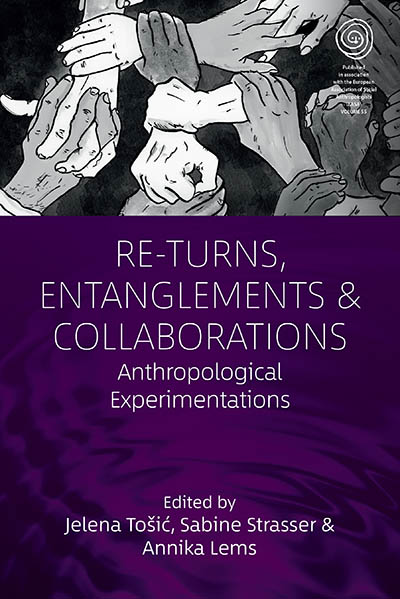The collection Re-turns, Entanglements and Collaborations: Anthropological Experimentations, compiled by Jelena Tošić, Sabine Strasser & Annika Lems, marks the EASA Book Series’ 50th volume and celebrates collaborative forms of knowledge production in anthropology.

As the editors argue:
It is organized around eight key themes and concepts that have marked anthropological debates in Europe over the past 20 years. Featuring engaging contributions, anthropologists from different generations and backgrounds come together to collaboratively reflect on questions that keep recurring throughout the book series. As a tribute to anthropology in and of Europe, the book is an experiment in collaboration as much as a testament to anthropology’s vitality and relevance in a world which sees itself confronted by challenges of planetary dimension.
I was honoured to have been invited by the editor to act as ‘chapter editor’ of a reflection on the transformations of ethnography in the recent decades, tasked with selecting collaborators to accompany me in this reflection. Following an editorial suggestion, these were to be ethnographers at different stages of their careers, experimenting with and exploring the mediaof ethnography and a wide range of problems. At the editors’ request, these were t be relevant colleagues different from my regular cothinkers or coinstigators. Also, it required finding the appropriate way of discussing these matters without the grounds of existing knowledge or interactions, and without a suitable opportunity to meet in person to do this. To respond to this challenge, I conceived my role less as an editor and more as a ‘host’: the facilitator of a collaborative process, creating the conditions for the conversation to be fruitful in a rather open-ended way
I had the immense luck of counting on the following guests for our conversations ‘in the kitchen’ of more than textual ethnography:
Maka Suárez, part of the Kaleidos collective (Universidad de Cuenca, Ecuador), who collaborated in the construction of the digital ethnographic platform (EthnoData) designed by Jorge Núñez to pursue research and public engagement work on data practices in and around different forms of violence in Ecuador.
Claudio Sopranzetti, coauthor of The King of Bangkok, a collaborative ethno- graphic novel with editor and translator Chiara Natalucci and illustrator Sara Fabbri based on fieldwork on political movements in Thailand.
Indrawan Prabaharyaka, a member of Labtek Apung (Floating Tech-Lab), a collective whose members are a chemist, an engineer, a visual artist, an architect, and an anthropologist. We work on urban ecology We have done several projects on river pollution, we are currently experimenting with architectural- cinematographic techniques to immerse in and engage with the world of nonhuman primates in Muaragembong, mangrove patches at the periphery of Jakarta.
Marina Peterson, who besides her interest in airport noise as amplifying the indefinite urbanism of Los Angeles has been exploring how experimental forms of writing and sound recording can probe into difficult-to-grasp atmospheric phenomena. She is codirector of the Bureau for Experimental Ethnography at UT Austin, which organizes events and through a series of online meetings: recorded, later transcribed. A selection of these conversations formed the basis of the chapter, subject to a few rounds of rewritting.
***
Our conversations took place online: recorded, then transcribed. A selection of them formed the backbone of the first manuscript of the chapter, later reworked several times. In sharing fragments of our choral and virtual kitchen- like exchanges, we aim to further the book’s concern with collaborations and engagements, discussing the ‘more- than- textual’ transformations of ethnography. As we see it, this entails: (i) learning to appreciate collaborative experiments, projects and engagements – hence, opening up to the multivocality of the places we do research in, the plurality of ways of thinking, doing, telling and conceptualizing already present in the lives of our epistemic partners, from which we could re- learn and re- imagine our practice; and (ii) discussing the challenges of doing multimodal ethnographic projects today – the hopes and wishes, but also the problems or the predicaments encountered when exploring ethnography’s different means and modes of storytelling and doing abstraction. All in all, this was a very enjoyable process. We hope the result is also interesting for you, reader!
Ethnographies: In the kitchen of ‘more than textual’ ethnography
Throughout the last century, ethnography has come to stand as anthropology’s main empirical approach. Over this period, ethnography has developed into a particular mode of enquiry, partaking in and learning from the worlds and lives of people and other beings. This chapter aims to explore the challenges and possibilities of ‘more- than- textual’ approaches, paying particular attention to our own collaborative experiments as well as those of others who inspired us or with whom we have been in conversation. In reflecting about their challenges, we aim to foreground the ‘adventure of relevance’ that contemporary explorations in jointly crafting
research objects and conditions of contemporary anthropological enquiry might entail. We will discuss how contemporary ethnographic works have not simply expanded beyond the graphic but have affected our approaches and our objects of study, also refiguring how and what we take the object of anthropology to be, well beyond ethnos. Indeed, going beyond functionalist, structuralist or cultural–interpretivist approaches, some colleagues have started foregrounding multi- species or more- than- human or environmental concerns, engaging with hard-to-grasp atmospheric phenomena. What we find so intriguing about these experimental openings of the ‘more- than- textual’ is that they force us to consider the following questions: What is ethnography today? And, even more importantly, what could it become?
How to quote: Criado, T.S., Peterson, M., Prabaharyaka, I., Sopranzetti, C. & Suárez, M. (2025). Ethnographies: In the kitchen of ‘more than textual’ ethnography. In J. Tošić, S. Strasser & A. Lems (Eds.) Re-turns, Entanglements and Collaborations: Anthropological Experimentations (pp. 281-309). New York: Berghahn | PDF